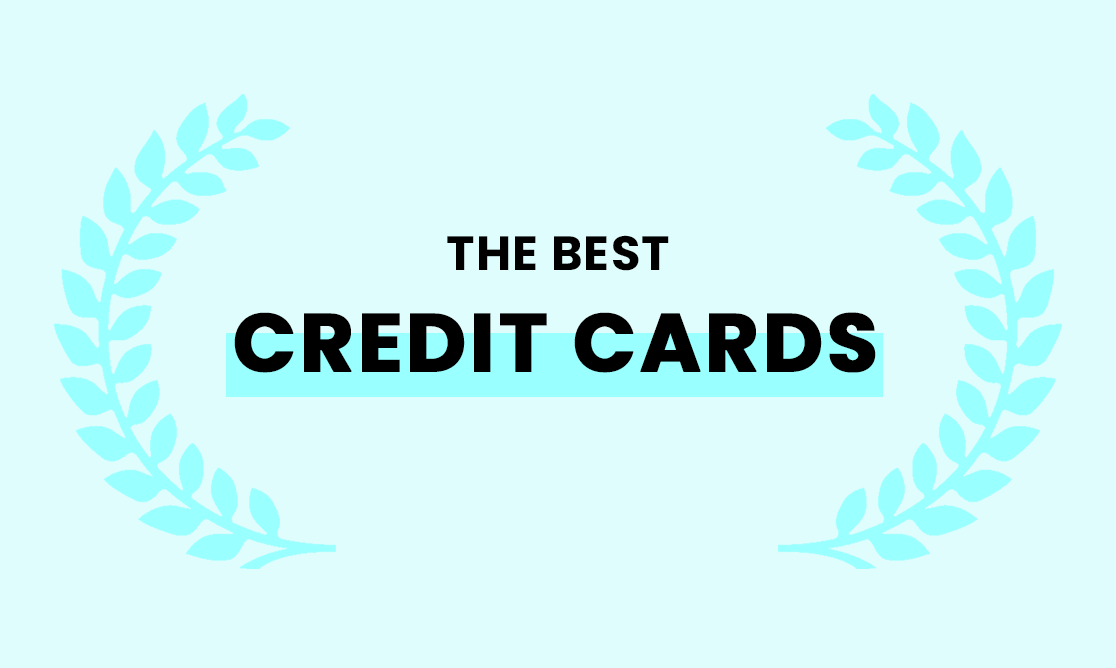When you are looking for a new credit card, it can be hard work to find the best one for your needs. That's why we ran the numbers on more than 100 credit card offers to choose our top 5 offers for balance transfers, cashback, earning Qantas points, low interest, and innovation.
So before you apply, check out our top 5 picks below.
Since everyone's financial position is different and everyone has different needs, we have picked credit cards that are the best for general use across 5 popular categories. The use of the word best* on this page does not mean that it is necessarily the best card for your circumstances.

Jump to offers

NAB Low Rate Credit Card
Best for balance transfers*

Balance transfers are all about saving money. So when we compared balance transfers offers, we wanted to look at more than just the balance transfer period. Why? Because no balance transfer fee and no annual fee in the first year could make the biggest to difference to your finances up front.
The NAB Low Rate Credit Card combines everything you need for a balance transfer with 0% interest for 28 months, a 2% balance transfer fee, and an $0 annual fee for the first year.
Interest reverts to the cash advance rate for any balance remaining once the introductory offer ends.
Bankwest, Citi and HSBC both offer slightly longer balance transfer periods.
Pros
- 0% p.a. for up to 28 months on balance transfers.
- Low 13.49% p.a. interest rate on purchases.
- $0 first-year annual card fee ($59 p.a. thereafter).
- Apple Pay, Samsung Pay and Google Pay compatible.
Cons
- There is a 2% balance transfer fee.
- Balance transfer reverts to cash advance rate of 21.74% p.a. after 28 months.

Qantas Premier Platinum Credit Card
Best for earning Qantas Frequent Flyer points*

Despite international borders being closed and travel bubbles being very limited, Qantas have reported that demand for domestic travel is back at 2019 levels.
Our choice for the best card to give any depleted Qantas Points balance a post-Covid boost is the Qantas Premier Platinum Credit Card.
It offers a discounted annual fee of $349 for the first year then reverts to $399 p.a. in the following year. Although relatively high, it is still comparable with other cards in this class. However, the range of benefits more than offset the fee. They throw the kitchen sink at new cardholders. These include up to 100,000 Qantas Points, and a balance transfer offer of 0% interest for 12 months with a 2% balance transfer fee. In addition, the complimentary Qantas club lounge access and the ongoing 1.5 points per $1 international spend are strong.
Pros
- The 100,000 bonus Qantas Points (Terms and Conditions apply).
- 0% p.a. for 12 months on balance transfers.
- Additional savings with the $349 first-year annual fee.
- Comes with complimentary travel insurance.
Cons
- There is a 2% balance transfer fee.
- The annual fee reverts to $399 after the initial year.

Bankwest Breeze Mastercard
Best for low interest on purchases*

The Bankwest Breeze Mastercard is an interest-free credit card that is a very cheap card during and after the introductory period. New cardholders can get 24 months at 0% interest on balance transfers. Crucially, this reverts to a very low 12.99% p.a. interest rate.
If you're looking for a no-frills card to spread out the cost of a purchase, this card is hard to beat.
Pros
- Enjoy 0% p.a. on balance transfers for 24 months (3% balance transfer fee, 12.99% p.a. thereafter).
- Up to 55 interest-free days.
- Compatible with Apple Pay, Samsung Pay, and Google Pay
Cons
- Foreign transactions will be charged 2.95% of the transaction amount.
- There is a 3% BT fee.

MoneyMe Freestyle Virtual Card
Most innovative*

The credit card application process typically takes a few days to complete from start to finish, but MoneyMe have revolutionised this with their Freestyle Virtual Card.
MoneyMe use artificial intelligence in their application process to speed up the approval process. If you apply and are approved, you can add the card to your mobile phone’s wallet and start using it immediately. This is the only credit card of its type on the market in Australia.
This is in marked contrast to other banks that may at best give you a decision within 60 seconds. And these are often provisional decisions, requiring additional information before you get a final decision.
Apart from the innovative application process, the card is quite straightforward. The annual fee ranges between $0 - $149 and is based on your credit report. Interest on purchases is below average.
Pros
- Apply online in minutes with an outcome on the spot.
- No waiting days for a physical card, it's instantly accessible via your mobile wallet.
- Tap n Pay in-store using Apple Pay or Google Pay.
- Shop now, pay later with up to 55 days interest-free on purchases.
Cons
- No rewards.
- No physical card, so you must have your phone to use.

Choosing a credit card
Types of credit cards and what to look for
The use of a term like “best” to describe a credit card can only be subjective. That is, a card that is best or ideal for one person may be completely unsuitable for another. And please note that the use of the terms "popular", "best" and "top" on this website are not product ratings or recommendations and are subject to our general disclaimer.
With that out of the way, let’s take a look at some of the features that make a card “best”, and who they are in fact best for.
Frequent flyer credit cards may be best for regular travellers
Anyone who travels by air regularly would be well advised to consider a frequent flyer credit card. Frequent flyer points earned on card purchases can mount up quickly and be exchanged for award flights or seat upgrades. (Other redemption options are available, but it’s generally agreed that award flights and upgrades deliver the best value per point.)
Like rewards points cards in general, frequent flyer points credit cards are only worthwhile if you are going to avoid interest charges by paying off your purchases balance in full every month.
Frequent flyer credit cards typically come with other complimentary benefits designed to assist the traveller, such as airport lounge access, travel insurance, free flights, flight discounts, travel agency credit and personal concierge service.
They come in several flavours:
- Qantas Frequent Flyer credit cards
- Emirates Skywards credit cards
- Credit cards affiliated with other rewards programs, but with an option to convert rewards points into frequent flyer points with Australian and global airlines
Balance transfer credit cards may be best for anyone struggling to repay their credit card debt
There’s usually a wide choice of credit cards which allow new cardholders to transfer a debt from one or more of their existing credit or store cards, and pay 0% interest on the transferred balance for an introductory period. The introductory period could be as much as 24 months, or even more.
So a balance transfer credit card would be a good choice for anyone with existing credit card debt since they can save a lot on interest charges they would otherwise incur. It’s also an option for debt consolidation, and cards issued by Citi, Coles, Qantas Money and Virgin Money even allow personal loan debt to be transferred to a 0% balance transfer credit card.
The best way to use a balance transfer credit card is to make a serious effort to repay the debt during the introductory interest-free period, since the high revert interest rate will apply to any debt remaining after the promotional period expiry date.
Rewards points credit cards may be best for someone looking for a compensation for everyday spending
A general credit card with rewards points could be a good option if you’re not a regular traveller and therefore not particularly interested in frequent flyer points. You don’t need to change your spending habits, but just aim to put through your rewards credit card as many of your purchases and bill payments as possible.
The rewards points will mount up with no extra effort on your part, and can be exchanged for benefits such as money off your supermarket shopping, gift cards to spend at national retailers, cashback on your card account, movie tickets and other entertainment, travel and accommodation, and merchandise from an online catalogue. With some rewards programs you can even choose an auto-redemption, so that a gift card (for example) will automatically be sent to you once you ave accumulated the required number of points.
Although there are some rewards points credit cards which don’t charge an annual fee, most of them will have a higher annual fee than cards with no rewards program attached. So it’s only worth paying the higher annual fee if you are going to avoid interest charges by paying off your purchases balance in full every month.
Australian credit card rewards programs (excluding specific frequent flyer programs) include:
- American Express Membership Rewards
- ANZ Rewards
- Bankwest More Rewards
- Citi Rewards
- Coles flybuys
- Commonwealth Bank Awards
- NAB Rewards
- St. George/Bank of Melbourne/BankSA Amplify Rewards
- Westpac Altitude Rewards
0% purchases offer credit cards may be best if you’re planning major expenditure
Have you got an overseas holiday planned, or your wedding and honeymoon on the horizon? Or perhaps you need to replace tired furniture and worn-out kitchen appliances, or want to splash out on the latest technology? In that case, a credit card with a promotional interest rate offer of 0% on purchases could suit you very well.
Although all credit cards offer interest-free days every month – typically up to 44 or 55 days – those interest-free days disappear if you don’t pay off your purchases balance in full on each payment due date. But if you choose a new credit card with an introductory offer of 0% on purchases (usually for between six and 15 months) you can pay only the minimum repayment each month and yet be charged no interest on the remaining balance while the offer lasts. It means that you can spread the repayment for your major purchase over a prolonged period.
But do plan to have the cash ready for full repayment once the introductory offer expires. If you don’t clear all your debt at this point, your balance will incur interest charges at the high revert interest rate.
Dedicated business cards may be best if you run a company or have an ABN
Most card providers offer a range of cards to suit business users. They range from high-end corporate cards for major enterprises with lots of employees needing cards on a single account, to basic business credit cards for sole traders.
One thing they all have in common is a list of features designed to make your business life easier, which may include travel benefits like free travel insurance and airport lounge access, business accounting tools like BAS-friendly reporting and seamless integration with your accounting system, or simply a higher credit limit so that you can cover your operating expenses with credit card payments.
It’s possible to find both business credit cards and business charge cards offering rewards or frequent flyer points, or low interest business cards to smooth out the cash flow bumps if your business income and expenses fluctuate seasonally.
Low interest credit cards may be best if you don’t expect to repay your account balance in full every month
The best way to use a credit card is to pay off your accumulated balance every month, on or before the payment due date, after taking full advantage of the card’s standard monthly interest-free days. But if your income is unpredictable, or your expenses fluctuate, you may know that this is not always going to be possible for you.
In that case you need to shun rewards points and complimentary benefits, and opt for a card with a low ongoing interest rate on purchases. Instead of paying a more typical credit card interest rate of 18-21% p.a., you can find a card with a rate of 12% p.a. (which is low, for a credit card) or possibly even less.
A ‘no annual fee’ credit card may be best if you’re on a budget, or for emergencies
If finances are tight and your main reason for needing a credit card is simply the convenience of being able to make fast, secure payments while taking advantage of standard monthly interest-free days, you can choose from a range of credit cards with no annual fee. Although they come with few bells and whistles, they get the job done and don’t cost you a cent if you always repay your total balance on time every month. The cost-free element is also useful if you just want to keep the card in your wallet for use in emergencies, such as car repairs, medical bills, or simply running out of cash.
But it’s still possible to get a card with no annual fee and yet earn rewards points (admittedly at a slower than normal rate) or take advantage of some limited complimentary benefits like a concierge service, free global Wi-Fi, or purchase protection insurance.
Other card features that may be ‘best’ in your case
There are other card features, not mentioned yet, which may make a particular card ‘best’ for you, overriding any of the benefits already listed. A ‘best’ card for you could be:
- A student credit card with a low minimum income requirement, low credit limit and low or no annual fee
- A ‘no foreign transaction fee’ credit card because you travel overseas regularly or shop online with overseas merchants
- An instant approval credit card because you need to get your hands on that plastic in a hurry


